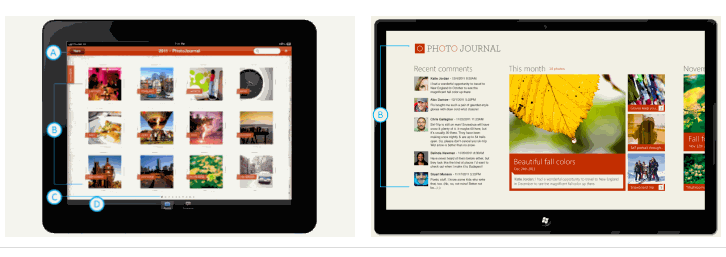Microsoft details how iPad app development compares to Windows 8

Microsoft officials have posted to the Windows Dev Center a design case study that compares and contrasts iPad app development with Windows 8 Metro-style app development.
(click on image above to enlarge)
"In this case study we want to help designers and developers who are familiar with iOS to reimagine their apps using Metro style design principles. We show you how to translate common user interface and experience patterns found in iPad apps to Windows 8 Metro style apps," explain the case study authors in their introduction.
The case study isn't a how-to. It is more of a visual comparison, showing how an iOS-based photo journal app works and looks on the iPad as compared to a Windows 8 tablet. The brief article focuses on the differences in layout and navigation; commands and actions; orientation and views; notifications; and touch gestures.
The article also touches on contracts. Microsoft officials first outlined the contracts concept publicly at the Build conference in September 2011. Since then, they've published a bit more guidance on contracts to the Windows Dev Center.
A Windows 8 contract, as Microsoft describes it, "is like an agreement between Windows and one or more apps. Contracts define the requirements that apps must meet to participate in these unique Windows interactions." Developers of Metro-style apps -- a k a WinRT-based apps -- are encouraged to make use of these contracts.
In a March 2012 piece on app contracts and extensions, the team itemized the different available Windows 8 contracts. These include:
App to app picking: Designed to "help users pick files from one app directly from within another app"
Play To: Helps users play digital media to connected DLNA devices from within an app
Search: Adds a search pane to an app "so users can search not only your app's content but content from other apps as well," according to Microsoft's description. "Users can also transfer the search query itself to other apps."
Settings: Provides in-context access to settings that affect the user's experience with an app
Share: Meant to help users share content from your app with another app or service, and vice versa. "Participating in the Share contract means that you don't have to write extra code or provide other developers with an SDK for your app just to share content," Microsoft officials explained.
If you've heard Windows execs claim that "the more apps you put on Windows 8, the more powerful and richer your experience gets," it's their hope that new Windows 8 apps will incorporate contracts that is behind this claim.
A couple more quick links of potential interest to Windows 8 developers and wannabes:
- Microsoft is holding an event at its Silicon Valley campus on April 4 that is aimed at startup developers and designers. There will be hacking stations and Windows 8 deep dive information shared there.
- There is also an "HTML5 community night" event on April 10 at Microsoft Mountain View. These are focused on open-source projects using HTML5. They look a lot like the original Microsoft Mix events, with participants from Adobe, Google, Mozilla and Microsoft on the docket. The three-hour event also will be Webcast, according to a blog post from a Microsoft developer evangelist.
(Thanks to Softie Harry Mower for the link to the iPad vs. Windows 8 case study.)
